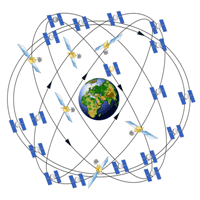The White House showed continuing support for the GPS program with a budget request that was, with one key exception, comparable to that of previous years. That exception though, a cut to GPS III procurement including the zeroing out of advance procurement monies, resulted in an overall program reductions of roughly $100 million.
The White House showed continuing support for the GPS program with a budget request that was, with one key exception, comparable to that of previous years. That exception though, a cut to GPS III procurement including the zeroing out of advance procurement monies, resulted in an overall program reductions of roughly $100 million.
Released yesterday (February 2, 2015), the budget proposal for Fiscal Year 2016 (FY16) will support the purchase of one GPS satellite. The White House requested a total in procurement funds of $265 million and $673 million for Research Testing Development and Evaluation (RTD&E).
The White House asked for $199.22 for a single GPS III satellite. That is nearly $36 million less than requested last year when the plan also was to procure a single next-generation spacecraft. The White House entirely dropped the budget line for advanced procurement for GPS III. Last year that line item gave the program $87.0 million to work with after Congress added funds.
This year, however, the White House asked for a plus-up in purchasing power for GPS IIF satellites. The request of $66.14 million is about a third more than what was requested and allocated last year. In fiscal year 2015 the White House asked for $52.09 million. Congress cut that slightly to an even $50.00 million.
The Obama administration also requested a substantial increase in the monies for the Next Generation Operational Control Segment and the GPS Enterprise Integrator. These two efforts would receive $350.23 million if the full request were approved. Last year the administration requested and received $299.76 million.
However, the Military GPS User Equipment (MGUE) program took a hit. The White House requested and received $156.56 million in fiscal year 2015 for MGUE. For FY16 they droped that request to $142.29 million.
The administration did stand pat on its request for GPS civil funding in the Department of Transportation budget. The request for $27 million was the same as that requested last fiscal year. The Departments of Transportation and Defense are rumored to be planning a joint effort to support the civil funding budget and stave off the sort of devastating cuts the line item has repeatedly received.
Congress slashed the FY15 request to only $10 million. For FY14 Congress gutted the $20 million request, leaving a mere $6 million to fund the civil portion of the GPS program and its contribution to the National Coordination Office. If the civil GPS budget is cut again this year, it is likely to affect the timeline of the overall GPS program, experts have told Inside GNSS.
Although both the White House and Congress appear to agree that the Pentagon needs more money, given the rising number of threats, the debate over how to make that possible is likely to be rancorous at best.
"There is no doubt that the nation’s security requires more spending than is permitted under the current levels,” said House Armed Services Committee Chairman Mac Thornberry, R-Texas, in a statement. “Meeting the nation’s needs, however, requires a Commander-in-Chief who is willing to work with Congress to solve the problem rather than continue on the campaign trail.”
"The Armed Services Committee,” Thornberry said, “will continue to examine the serious state of security challenges we face and help develop a serious budget proposal to address them."





